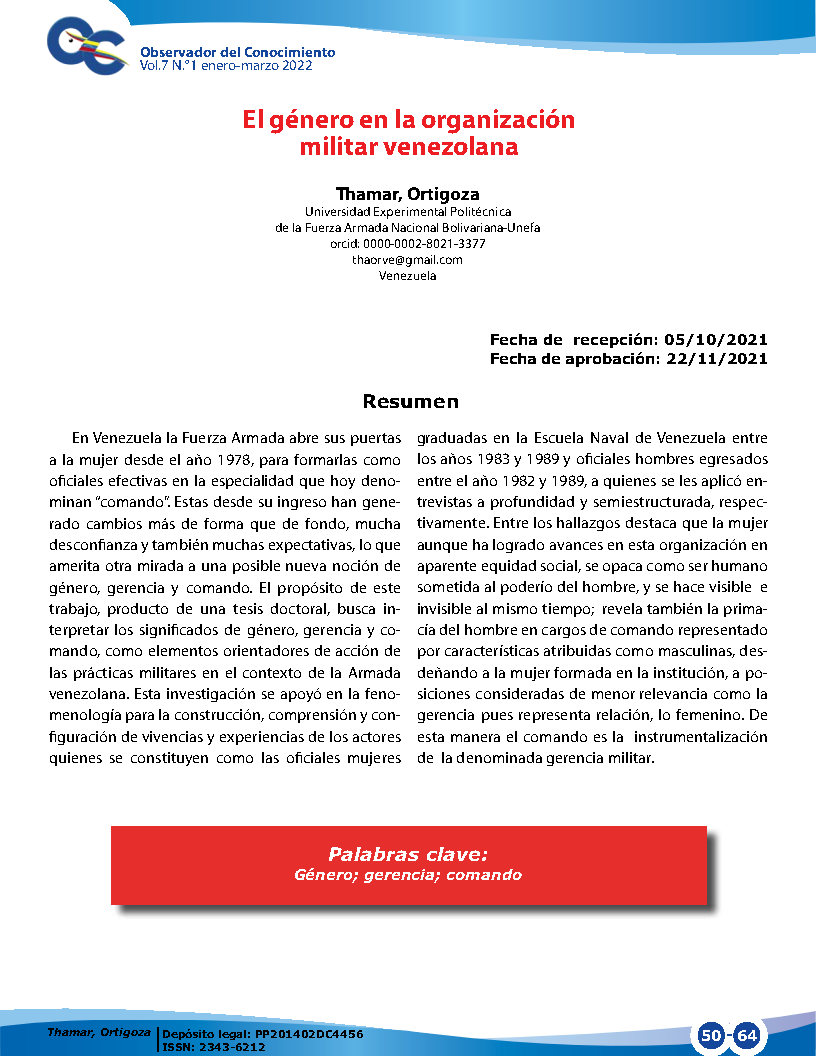Gender in the Venezuelan military organization
Keywords:
Gender, management, commandAbstract
In Venezuela, the Armed Forces have opened its doors to women since 1978, to train them as effective officers in the specialty that today they call "command." These since their entry have generated changes more in form than in substance, a lot of distrust and also a lot of expectations, which warrants another look at a possible new notion of gender, management and command. The purpose of this work, the product of a doctoral thesis, seeks to interpret the meanings of gender, management and command, as guiding elements of action of military practices in the context of the Venezuelan Navy. This research was supported by phenomenology for the construction, understanding and configuration of experiences and experiences of the actors who are constituted as female officers graduated from the Venezuelan Naval Academy between 1983 and 1989 and male officers graduated between 1982 and 1989, who received in-depth and semi-structured interviews, respectively. Among the findings, it stands out that the woman, although she has made progress in this organization in apparent social equity, becomes opaque as a human being subjected to the power of man, and becomes visible and invisible at the same time; It also reveals the primacy of the man in command positions represented by characteristics attributed as masculine, disdaining the woman trained in the institution, to positions considered of less relevance such as management because it represents relationship, the feminine. In this way, the command is the instrumentalization of the so-called military management.
Downloads
References
Beauvoir, De S. (1949). El segundo sexo. Los hechos y los mitos. Buenos Aires: Editorial Siglo Veinte.
Bonilla, E y Rodríguez, P. (2005). Más allá del Dilema de los Métodos. La Investigación en las Ciencias Sociales. Caracas: Editorial Norma.
Borjas, L. y Monasterio, D. (2010). Una aproximación a la Comprensión de la Gerencia Venezolana. Ponencia presentada al VII Congreso de Investigación y Creación Intelectual. UNIMET. Caracas.
Carreño, F., Vargas, A. y Giraldo, G. (2017). Caracterización del rol actual de la mujer en la gerencia de proyectos en Colombia. Revista EAN, 83, PP 93-117. Recuperado en: https:// doi.org/10.21158/01208160. n83.2017.1823
Carreiras, H. (2018). La integración de género en las Fuerzas Armadas. Condicionamientos y perspectivas. Nueva Sociedad Nº 278,noviembrediciembre de 2018. 130-143. https://static.nuso.org/media/ articles/downloads/11.TC_ Carreiras_278.pdf
Desiato, M. y Guevara, M. (1998). El hombre en la Teoría de la Administración. Antropología y Ética en el Ámbito de Organización y Gerencia de Empresas. Caracas: Universidad Católica Andrés Bello.
Drucker, P. (1999). Gerencia para el Futuro. Colombia: Grupo Editorial Norma.
Ejército Venezolano. (1997). Diccionario de términos militares y asociados del Ejército de Venezuela. Caracas: Escuela Superior del Ejército.
Foucault, M. (1999). Estética, Ética y Hermenéutica. Barcelona: Editorial Paidós.
Foucault, M. (2007). Nacimiento de la Biopolítica. Curso en el Collège de France (1978-1979). Fondo de cultura económica.
Husserl, E. (1976). Problemas fundamentales de la fenomenología. Buenos Aires: Fondo de Cultura Económica.
Ley Constitucional de la Fuerza Armada Nacional Bolivariana de 2020. Gaceta Oficial de la República de Venezuela N° 6.508. Extraordinario de fecha 30 de enero de 2020.
Lucero, M. (2018). La larga marcha de las mujeres en las Fuerzas Armadas latinoamericanas. Nueva Sociedad Nº 278, noviembre-diciembre de 2018. 144-151. Recuperado en: https://www.nuso.org/ articulo/la-larga-marcha-delas-mujeres-en-las-fuerzasarmadas-latinoamericanas/
Ministerio de la Defensa. (1993). Manual de liderazgo. Caracas.
Mintzberg (1991). Mintzberg y la Dirección. Madrid: Ediciones Díaz de Santos, S.A.
Mosterin, J. (1993). Filosofía de la Cultura. 2da Edición. Madrid: Editorial Alianza S.A.
Murcia, N. y Jaramillo, L. (2008). Investigación cualitativa “la complementariedad”. Colombia: Kinesis 2000.
Muralt, A. (1963). La idea de la fenomenología. El ejemplarismo husserliano. México: UNAM.
Organización de las Naciones Unidas (ONU). Resolución 1325 Aprobada por el Consejo de Seguridad en sesión 4213ª, https://www.un.org/women-watch/ods/S-RES-1325(2000)-S.pdf
Red de Seguridad y Defensa de América Latina (RESDAL). Atlas Resdal de la Defensa. Edición 2016. http://www.resdal.org
Santos, A. y Madureira, J. (2001). Metodología de las ciencias sociales. Portugal: Ediçoes Afrontamento.
Schütz, A. (1972). Fenomenología del mundo social. Introducción a la sociología comprensiva. Barcelona: Editorial Paidós Ibérica
Schütz, (1993). La construcción significativa del mundo social. Barcelona: Editorial Paidós Ibérica.
Stiegler, B. y Gerber, E. (2009). Género y poder. El significado del género en los más altos cargos políticos: los casos de Alemania, Chile, Argentina y España. Santiago de Chile: Friedrich-Ebert-Stiftung.
Taylor, S. y Bodgan, R. (1987). Introducción a los métodos cualitativos de investigación. La búsqueda de los signifi-cados. Argentina: Editorial Paidós.
Zubiri, X. (2006). Tres dimensiones del ser humano: individual, social, histórica. Madrid: Alianza editorial.

Downloads
Published
How to Cite
Issue
Section
License
Copyright (c) 2022 http://creativecommons.org/licenses/by-nc-nd/4.0/

This work is licensed under a Creative Commons Attribution-NoDerivatives 4.0 International License.







